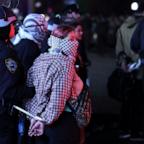Modern Bridge Is Welcome, T-Shirts Are Not
Clash of views defines today's Jerusalem.
JERUSALEM, June 26, 2008 — -- A brand new $73 million bridge is a flashy addition to the Jerusalem skyline, standing tall amidst buildings of traditional Jerusalem stone.
The bridge is the image of modernity in the ancient city. But the gala opening of the bridge created a controversy over teenage girl dancers that one critic said was more appropriate for Iran than Israel.
The bridge celebration was scheduled to include a dance performance by 13- to 16-year-old girls, but pressure from ultra-Orthodox religious conservatives first changed their outfits and then canceled their routine.
Ironically, the flap over the dancers' modest pants and T-shirt costumes came one day before the city's gay pride parade, which annually attracts thousands of marchers.
The dancers usually perform in simple outfits of matching white pants and T-shirts. Yesterday, however, the young girls were given long brown frocks that came to their ankles, obscuring their figures. They were told to cover their hair with tight black caps.
And instead of dancing, they were left just standing on the stage in their shapeless robes.
"We have never had problems before," the dance company manager, Yaniv Hoffman, told ABC News, noting that the group has performed at all the official ceremonies in Jerusalem for the last 20 years.
"We were told before the performance that there would be a lot of religious people at the event," Hoffman said. "Someone came and checked the dances and the outfits beforehand, and told us that everything was acceptable."
The morning of the performance, Hoffman was informed that someone coordinating the event had bought the special caps for the girls. "They didn't want them to be recognizable as girls," he said.
Ultimately, the group did not end up performing their dances at all. They appeared on the stage with torches, dressed in their modest clothes, and then went off the stage.
"They didn't even want us to appear at all. That was the whole point -- to break us," Hoffman said. "But if we just went home like they wanted us to, then no one would know what happened or talk about it."
Jerusalem City Councilman Saar Netanel said he thought the decision to cancel the dance was outrageous, and that there was nothing in the dancers' behavior to warrant a change.




